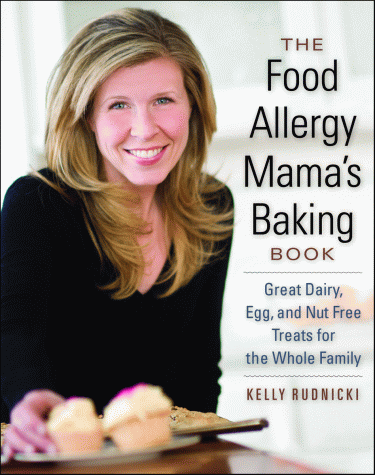A couple of weeks ago I reviewed an allergy-free snack called, HomeFree. Buying ready-made snacks can be expensive to outright purchase. Then shortly after that I discovered an email in our inbox for an allergy-free cookbook. Knowing how many families are impacted with food allergies, I thought the cookbook could be an alternative for families on limited budgets or who love to bake. I will be writing my review of the cookbook this week. In the meantime, Agate Publishing (AP) provided me with a Q & A session with the “Food Allergy Mama” and author, Kelly Rudnicki, (KR) of The Food Allergy Mama’s Baking Book.
AP: You got started as a n allergen-free baker largely because your oldest son, John developed food allergies. How did you go about transforming normal recipes into allergen-free recipes?
KR: My son John was officially diagnosed with life-threatening food allergies near his first birthday. With his dairy, egg, and nut allergies, I knew I couldn’t buy a fun, whimsical cake at my favorite bakery to celebrate his birthday. I searched high and low for allergen-free cake recipes, but the ones I tried lacked flavor and were dry. As a self-proclaimed sweets freak, I was disappointed that my son wouldn’t be able to enjoy all the great treats that come with childhood. At that point I decided to take my favorite recipes and convert them to be allergen-safe and delicious.
AP: What is the most difficult part of reworking recipes to be allergen-free?
KR: Baking is a science, and when you take out a crucial ingredient like eggs it can drastically change the taste and texture of the finished product. Even tweaking the measurement of one ingredient affects the overall recipe. Through lots of trial and error I found that some of the best substitutes are the cheapest and most natural, like water.
AP: Did your children have a say in the recipes you created for this book?
KR: Every recipe in the book is loved by not only my children but by the children in my neighborhood. They were my focus group and were completely honest in taste-testing my recipes. If they devoured one of my cakes, muffins and cookies without skipping a beat, I knew I had a winner.
AP: Will people who do not have food allergies also enjoy the recipes?
KR: I love desserts, and it was very important to me that every single recipe was utterly delicious. They had to taste as good, if not better, than the real deal. Time and again I hear from friends, family, and my blog followers that no one suspects they are dairy, egg and nut free.
AP: What is your most requested recipe at home?
KR: All four of my children have their favorites, but hands-down the most requested is my chocolate chip cookies recipe. I make these cookies at least once a week, if not more often.
AP: Obviously, allergen-safe issues are a big challenge for families of school-age children. How have you and your family tried to meet that challenge?
KR: When my son started preschool, it was very difficult to advocate on his behalf because there still wasn’t a lot reported about food allergies. Oftentimes teachers and other parents were misinformed about the potentially life-threatening risk food-allergic children face. They wanted to have the freedom to still bring in cupcakes and cookies to class parties. Bringing unsafe treats to school not only excludes kids with food allergies but also puts their lives at risk. In my son’s case I have always met with his teacher at the beginning of the school year to educate him or her about the dangers of food allergies. Together we develop a plan specific to his classroom that includes sending out a letter to the other parents about food allergies and providing snack guidelines. We’ve had a few hiccups over the years but continue to make progress on awareness.
Now that more children are getting diagnosed with food allergies every year, more school districts are adopting district-wide policies to ensure the safety of their students. This includes eliminating food from class celebrations, keeping up-to-date food allergy action plans in the nurse’s office, and designating peanut-free areas in schools.
AP: Your blog, FoodAllergyMama.com, also addresses issues affecting families of children with allergies. What are some of the issues you’re trying to promote?
KR: The biggest issue facing parents of food-allergic children is awareness in the school setting. We have to get better about developing policies to ensure our children’s safety at school, camp, and even sports games. No children should feel left out because of their food allergies, and certainly their health shouldn’t be compromised.
In addition to awareness at school, we need to have updated policies at restaurants and airlines. There’s still no much gray area when it comes to policies and procedures, like an airline stating they don’t serve peanuts on a flight but then still allowing passengers to open their own bags of peanuts. The government also has to allocate a lot more money to food allergy research in order to find more treatments and ultimately a cure. It’s ridiculous how little money is given to food-allergy research projects in comparison to other medical issues.
Finally, my blog offers parents the opportunity to trade information and share stories. We all have felt isolated in our children’s diagnoses, and it is enormously helpful to know that we are not alone in our efforts to keep our children safe.
About the Author
Kelly Rudnicki is the creator of the blog FoodAllergyMama.com She is the mother of four small children in suburban Chicago and works in promoting food allergy awareness and advocating for children with special needs. She has also worked as a television news producer and in corporate public relations. This is her first book.
